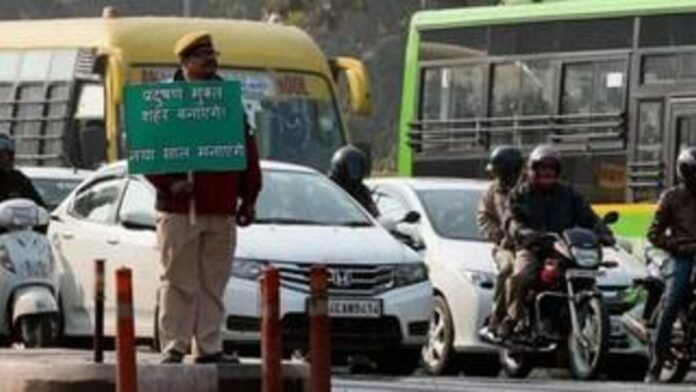After the Supreme Court evaluates the planned odd-even car-rationing scheme and delivers an order, the Delhi administration will decide whether to implement it in the city. On Friday, the case will be heard.
The national capital’s extreme air pollution was somewhat alleviated on Friday morning in Delhi, Noida, and Gurugram thanks to overnight rain. The municipal government was considering cloud seeding to reduce the poisonous air that was engulfing the metropolis.
The Delhi government informed the Supreme Court during the Friday hearing that, according to the analysis, there was a drop in vehicle kilometers traveled (VKT) of almost 6% during the odd-even scheme period, or 37.80 lakh vehicle km/day.
It further told the court that under the odd-even program in the city, less vehicle kilometers driven would equate to a lower fuel usage. The Delhi government stated in an affidavit that “it has been estimated that there was about 15% decrease in fuel consumption on an average day during the odd-even scheme implementation.”
“The DIMTS report’s findings generally indicated a positive impact in reducing vehicle-related air pollution, in addition to reducing traffic on Delhi’s roads and increasing the share of public transportation during the odd-even drive period,” the report continued.
According to Swiss company IQAir, the city’s air quality index (AQI) improved to 127 early on Friday, marking a positive shift from the “hazardous” 400–500 level observed during the previous week. The city was the most polluted in the world until Thursday.
In an effort to address dangerous air pollution in the city, the Delhi government has also opted to foot the whole bill for artificial rain. The chief secretary has been instructed to put the government’s case before the Supreme Court on Friday. The Delhi administration can set up the first phase of artificial rain in the city by November 20 if the Center approves of the move, an official told a news agency.
The Delhi government’s car-rationing plan, which aims to reduce vehicle pollution, was questioned by the Supreme Court on Tuesday, calling it “all optics” and questioning its effectiveness.
Expecting further degradation of the air quality after Diwali, Delhi Environment Minister Gopal Rai had announced on Monday that the flagship program—which allows cars to operate on alternate days based on the odd or even last digit of their registration numbers—would be enforced from November 13 to November 20.
Concurrently, the Delhi government, led by the Aam Admi Party, made the decision to appoint ministers from Delhi to guarantee the execution of anti-pollution policies. Several ministers from Delhi were observed on Thursday night conducting inspections of various locations and borders that link Delhi with neighboring states.
Rai inspected vehicles and trucks entering Delhi at the Singhu border.
“After seeing the level of pollution in the national capital, the entry of trucks carrying non-essential items has been banned. Only entry of CNG and electric trucks has been allowed. Teams have been deployed on all the borders for this. Tomorrow I will again write a letter to the Haryana and UP government regarding the entry of the trucks,” said Rai while inspecting trucks entering the national capital.
Atishi, a different minister, was also observed examining cars at the Ghazipur border while assessing the effectiveness of the air pollution control measures being put in place.
“We have come to know that systems need to be strengthened on the borders because there are several trucks that are not allowed to enter the national capital but are entering illegally,” Atishi stated while examining trucks. Today, every minister in the government of Delhi is checking various borders to make sure that no vehicles are entering the capital illegally.”
“These inspections will continue. We are going to request the Supreme Court to direct all the central agencies to cooperate with the Delhi government regarding ‘artificial rain’ in the city. By November 20 this can be done,” she added.
Other ministers Kailash Gahlot and Saurabh Bharadwaj were also observed examining cars that entered the city from the Gurugram boundary.
“We are receiving complaints that GRAP-4 rules are not being followed strictly. The implementation of GRAP-4 means trucks with essential items can only enter Delhi. Today we have come here to Gurugram, and we are witnessing the negligence in the implementation of rules. To decrease air pollution in Delhi, these rules need to be followed strictly,” Bharadwaj said while inspecting trucks.
“The drivers are saying that they are from Rajasthan. The Rajasthan Government is not making them aware that because of high pollution in Delhi, only trucks with essential services are allowed to enter. All the states of the NCR have to run an awareness campaign about it. The drivers are saying that they did not know that some trucks are banned in Delhi,” Gahlot said.
Following a discussion with officials and cabinet members, Rai determined that all Delhi ministers would ensure the implementation of air pollution control measures on the ground, which led to the inspections.
The nation’s capital currently operates under Stage IV of the Graded Response Action Plan (GRAP) following a sharp decline in air quality to the’severe plus’ level.




